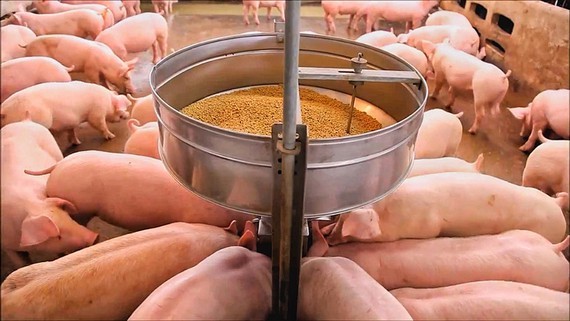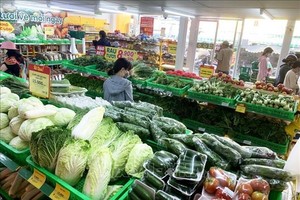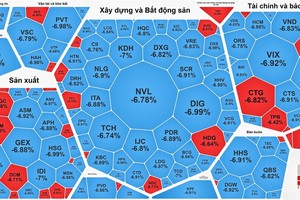
It was recorded that at rural markets in Lai Vung District in Dong Thap Province, the price of pork fluctuated from VND150,000 to VND170,000 per kilogram, double that in the same period last year. Of which, the pork belly was priced at VND150,000 per kilogram; pork fillet and ham fetched VND170,000 per kilogram; pork chops and pork ribs were sold at VND160,000-VND170,000 per kilogram.
Due to insufficient supply, the price of pigs in the Southern market on May 22 increased by VND1,000-VND3,000 per kilogram compared to the previous day, hovering around VND97,000-VND100,000 per kilogram. According to traders, the price of pigs will exceed VND100,000 per kilogram and pigs will be unavailable shortly because supply is exhausting.
Mr. Quoc Hung, a farmer in Mang Thit District in Vinh Long Province, said that his pig farm is currently empty as the African swine fever epidemic killed 20 sows and 200 market hogs. Now the price of pigs highly increases but he does not have pigs to sell. He is planning to repopulate his pig herd but remaining hesitant because he does not know whether the disease will recur or not, at the same time, the price of piglets is extremely high at above VND150,000 per kilogram. Therefore, it is unlikely that he will repopulate his pig herd.
Currently, the price of 28-day-old piglets whose weight is around 6-7 kilograms is VND2.7 million per piglet; that of 60-day-old ones with a weight of around 20 kilograms per piglet is VND180,000 per kilogram or VND3.6 million per piglet. The price of gilts is at around VND11.5 million each. According to Mr. Hung, provincial authorities also provide piglets for farmers but each district can receive only 40 piglets so that is not enough for each commune if divided equally. Besides, pig farms must reach standards to receive support.
The family of Ms. Le Thi Phuong, a farmer in Phung Hiep District in Hau Giang Province, has raised pigs under biosecurity standards for C.P Company for five years. She said that her family only has to take care of pigs while the company provides piglets, sty, feed, and medicines. Currently, there are more than 800 pigs in the pigsty. After raising pigs for three months, she earned a profit of above VND50 million. She shared that she would be rewarded more if the raising result was beyond the requirements signed in the contract. In the last African swine fever epidemic, for raising pigs under biosecurity standards, her pig herd was not affected and she also earned profits. However, the interest rate does not depend on the market factor.
According to Mr. Phung Duc Tien, Deputy Minister of the Ministry of Agriculture and Rural Development, there is a shortage of pork supply due to the African swine fever epidemic. Therefore, for the disease not to recur, relevant industries need to concentrate on developing biosecurity pig farming, at the same time using probiotics, ensuring pork supply for the market. This is the most important solution that needs drastic concentration.
Mr. Nguyen Si Lam, Director of the Department of Agriculture and Rural Development of An Giang Province, said that the provincial total pig herd after repopulation is expected to exceed 22,000 pigs by the end of this year. However, the province encourages farms and households to carry out pig repopulation cautiously to minimize the risk of a disease outbreak, especially focusing on biosecurity and environmentally-friendly pig farming. The provincial authorities will help farmers to repopulate pig herds with a support limit of 50 percent of the value of piglet but not exceeding VND3.2 million per piglet. Each household will be supported from 5 to 40 piglets. However, authorities recommended that farmers need to clean their pigsties, disinfect, and ensure the technical requirements before repopulating. Pig repopulation is not allowed at pig-farming households in residential areas and inner cities.
In Dong Thap Province, the province with the second largest pig herd in the Mekong Delta just behind Tien Giang Province, the pig-farming industry is gradually recovering its proportion, aiming to achieve a production value of above VND2.3 trillion this year, up more than 10 percent compared to the previous day. Accordingly, the pig repopulation plan of the province is attached with the pig-farming restructuring plan for the period from 2020 to 2025. Of which, at least 30 percent of large pig-farming households will ensure biosecurity requirements, disease safety, and environmental protection in husbandry.
























